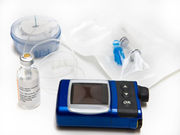Tag: Diabetes: Type I
CABG May Be Best for Multivessel Revascularization in T1DM
Increased risks of coronary heart disease mortality, MI, repeat revascularization with PCI
Characteristics of Diabetes in Infancy Explored
Overall frequency of diabetic ketoacidosis 66.2 percent; odds increase with age at diagnosis
Peptide Immunotx Well Tolerated in New-Onset Type 1 Diabetes
No decline in C-peptide with peptide immunotherapy; no change in insulin use over 12 months
Exercise Training Improves Left Ventricular Function in T1DM
Improvement in aerobic capacity and stroke volume lower for teens with T1DM than control healthy teens
International Variation in Prevalence of Celiac in T1DM
Overall, 3.5 percent of children had biopsy-confirmed CD; prevalence was higher for girls than boys
Increased Parental Anxiety With Increased Diabetes Risk
Anxiety up for parents of children at increased genetic risk with positive islet autoantibody testing
Genetic, Environmental Exposure Tied to Islet Autoantibodies
Link for male sex; father, sibling as diabetic proband; weight at 12 months with insulin autoantibodies
T1DM Patients With Active β-Cell Function Differ Immunologically
Findings for patients with remaining endogenous β-cell function after 10 or more years of T1DM
sRAGE Linked to Risk of Incident Diabetic Nephropathy
Independent link seen for soluble receptor for advanced glycation end products, but not for CML
Diabetic Ketoacidosis Poses Fetal Risk During/After Event
Risk of fetal demise increased with maternal ICU admission and higher serum osmolality during DKA














